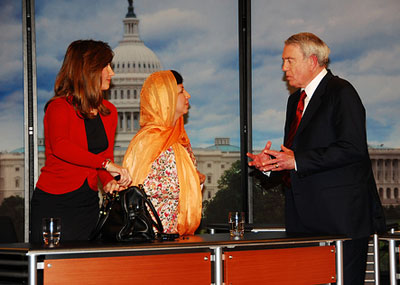
UPDATE: The episode of Dan Rather Reports featuring the women of the Institute for Inclusive Security will air tonight at 8 p.m.and 11 p.m. EST. Tune in via HDNet, and check out a podcast of the show tomorrow on iTunes. Here’s a preview.
Feb. 13, 2010 — The Institute for Inclusive Security recently wrapped up its annual conference that brings some of the women in the organization’s impressive global network together face-to-face to discuss the challenges and victories they’ve had as prominent leaders in their own countries. This year’s participants came from Rwanda, Pakistan, Bosnia, and Lebanon.
I had the good fortune of sitting in on a taping of Dan Rather Reports, which for this episode highlighted the question “Can Women Stop War?” Featuring Alice Urusaro Karekezi of Rwanda, Amra Seleskovic of Bosnia, Mossarat Qadeem of Pakistan, and Dima Sensenig of Lebanon, the episode showcased a wide variety of experiences working to resolve, recover from, and prevent armed conflicts. Ambassador Swanee Hunt, founder of the Institute for Inclusive Security, joined the discussion, contributing insights from her work promoting women in peace processes around the world.
The show included two panels, starting off with Ms. Karekezi and Ms. Seleskovic and then featuring Ms. Qadeem and Ms. Sensenig for the second half. There was a great chemistry among the guests and longtime reporter Dan Rather, and the conversation flowed easily from discussions of the natural tendencies of women that make them good negotiators to anecdotes from post-genocide Rwanda, Bosnia’s fragile rebuilding process, religiously diverse Lebanon, and remote, Taliban-controlled areas of Pakistan.
Some standout moments from the show:
— Acknowledging the limitations of generalizing about female leaders and male leaders as groups, Ambassador Hunt noted that women tend to have creative ways of solving problems because in many parts of the world, “they are second class citizens and have learned to think outside of the box.”
— In divided societies, women often bridge the gap through the roles they play in civil society. The circumstances in Rwanda after the 1994 genocide are an extreme example. Men had been targeted in the killings, and many were in jail, “so who was there taking care, repairing life?” Ms. Karekezi rhetorically asked. Women used this opportunity to assert themselves, yielding unprecedented results, she said.
— During 2008 elections, Rwanda became the first country in the world to have a majority of women in parliament. But as Ms. Karekezi pointed out, getting the numbers is an important first step but to maintain that influence, women will need training in leadership. “We need to ensure that women have the skills that men have,” she said.
— Ambassador Hunt spoke about the impact that including women has on negotiating peace deals. While the numbers are still too low to draw any scientific conclusions, she said that in her experience she has seen that there is a “marked difference” in the speed of negotiations and what’s included in the final deal. Far too often, peace agreements are “designed by people with no investment in having peace,” she said.
— Drawing from experiences in Federally Administered Tribal Areas and North-West Frontier Province of her native Pakistan, Ms. Qadeem addressed the issue of combating gender-based violence in a culture where women are dramatically undervalued. “What is culture? Culture is how we’re doing things right now,” she said. “So do we change culture, or do we let culture change us?” She told the story of an illiterate woman convinced by members of the Taliban that the Quran said she would be rewarded if she supported them. She aided them and encouraged her son to do the same – until Ms. Qadeem had a chance to meet with them. Sometimes changing culture is as basic as countering misinformation, Ms. Qadeem said.
— During a short break from filming, Dan Rather asked the guests more casually why women are so good at forgiving. Without missing a beat, Ambassador Hunt responded, “We have a lot of practice.” She later incorporated the comment into a more thoughtful response for broadcast, but her quick-witted delivery of the line off the air seemed to epitomize the canniness and sensibility that this remarkable group of women brings to their work.
The episode “Can Women Stop War?” is expected to air in mid-March on HDNet. Click here for details on how to tune in.

